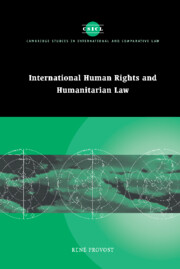Book contents
- Frontmatter
- Contents
- Acknowledgments
- Table of cases
- Table of treaties
- Table of other international instruments
- Introduction
- PART I Normative frameworks
- Introduction
- 1 Rights and procedural capacity
- 2 Obligations and responsibility
- Conclusion to Part I
- PART II Reciprocity
- PART III Application: law and facts
- General conclusion
- Bibliography
- Index
- CAMBRIDGE STUDIES IN INTERNATIONAL AND COMPARATIVE LAW
Introduction
Published online by Cambridge University Press: 07 September 2009
- Frontmatter
- Contents
- Acknowledgments
- Table of cases
- Table of treaties
- Table of other international instruments
- Introduction
- PART I Normative frameworks
- Introduction
- 1 Rights and procedural capacity
- 2 Obligations and responsibility
- Conclusion to Part I
- PART II Reciprocity
- PART III Application: law and facts
- General conclusion
- Bibliography
- Index
- CAMBRIDGE STUDIES IN INTERNATIONAL AND COMPARATIVE LAW
Summary
Part I analyses and compares the normative frameworks of international human rights law and humanitarian law by examining the way in which each is constructed to achieve its purpose, whether, in the first case, the granting of fundamental rights to the individual or, in the second, the alleviation of human suffering in times of armed conflict. This analysis will lead to an assessment of a number of conceptual differences between human rights and humanitarian law. While some have argued that the distinction is one of mere terminology, a convenient way of underlining the different fields of application of these two areas of international law, others have characterised the difference as fundamental and necessary for the development and viability of both human rights and humanitarian law. The discussion will also touch on the nature of the relations between the individual and the state in human rights and humanitarian law and, more generally, on the position of the individual in international law as embodied in these two areas of law.
It will be argued that there exists a real and meaningful difference between the normative frameworks of human rights law and human-itarian law. This difference rests on the fact that human rights law is centred, indeed built, on the granting of rights to the individual, while humanitarian law is focused on the direct imposition of obligations on the individual.
- Type
- Chapter
- Information
- International Human Rights and Humanitarian Law , pp. 13 - 15Publisher: Cambridge University PressPrint publication year: 2002
- 2
- Cited by

